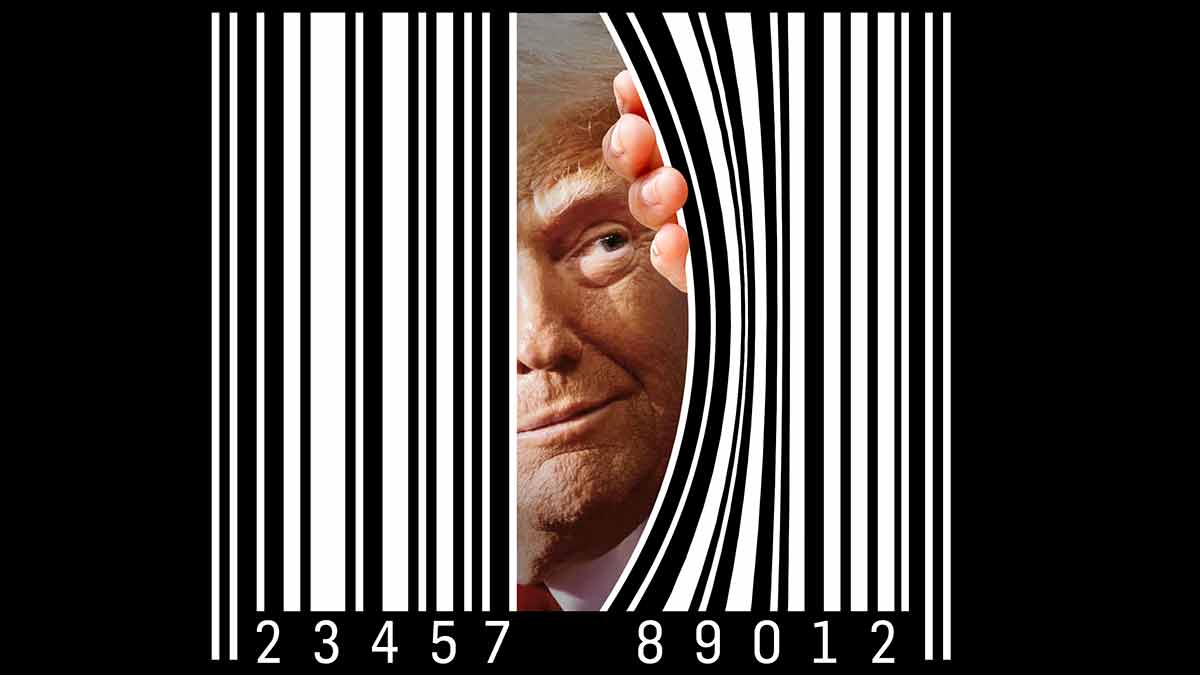Indian indices end lower post Donald Trump's tariff announcement, but avoid bloodbath seen in global markets
 Donald Trump | Imaging: Binesh Sreedharan
Donald Trump | Imaging: Binesh Sreedharan
Indian stocks end lower post Donald Trump's tariff announcement, but avoid bloodbath seen in global markets Indian stocks retreated on Thursday with the benchmark BSE Sensex and NSE Nifty 50 index declining around 0.4 per cent after US President Donald Trump announced reciprocal tariffs of varying degrees on multiple countries.
Sensex closed 322 points lower at 76,295.36 and the Nifty 50 closed at 23,250 10, down 82 points.
However, the losses on the Indian bourses were a far cry from the bloodbath that was seen in many global markets, amid growing concerns of a US recession and worries that the tariffs would escalate a trade war and disrupt the global economy.
Japan's Nikkei 225 index plunged 2.8 per cent, Hang Seng index in Hong Kong tumbled 1.5 per cent, the FTSE in London was down 1.2 per cent and the German Dax CAC40 in Paris fell over 2 per cent.
Acting on his reciprocal tariff threat, Donald Trump, on Wednesday, announced sweeping tariffs on imports from countries from Asia to Europe and Africa. India has been slapped with tariffs of 26 per cent. A baseline 10 per cent tariff would come into effect on Saturday with the higher reciprocal tariff effective April 9.
The tariffs slapped on India are more than two and a half times of the existing average tariff differential. However, several Asian peers, who are also big exporters, have been slapped with much higher tariffs. For instance, China has been hit with a 34 per cent tariff, on top of 20 per cent tariffs announced earlier. Vietnam has been hit with 46 per cent tariff. Bangladesh, a major garment exporter, has been levied 37 per cent tariff.
ALSO READ: Trump tariffs: India to enjoy competitive advantage over Asian peers but potential US recession could derail global economy
So, in comparison, India finds itself in a relatively advantageous position and that's why investors appear to have been relieved."The US reciprocal tariff of 26 per cent on India is higher than expected, but this tariff is relatively lower compared to that levied on countries like China, Vietnam, Thailand, Indonesia and Bangladesh, which compete with India for the export share; thus improving India’s potential export competitiveness," said Siddhartha Khemka, Head - Research, Wealth Management, Motilal Oswal Financial Services.
Importantly, energy and pharmaceuticals were exempted from the tariffs, for now at least. The US is a very big market for Indian pharmaceutical companies and this is a big breather for them.
Not surprisingly, pharma stocks were among the major gainers on the stock market on Thursday. The BSE Healthcare index jumped 1.8 per cent. Companies like Sun Pharma, Ipca Labs, Indoco Remedies, Lupin among others gained 4-5 per cent.
"India exported $8 billion of pharma products to USA in fiscal 2024, its largest export destination, and supplies 40 per cent of generics consumed in the USA and this move by the US Administration will help sustain exports," pointed out Anuj Sethi, senior director, Crisil Ratings.
He observed that India has more than 650 manufacturing facilities approved by the US Food and Drugs Administration, the second-highest number outside the US.
While tariffs on pharma at a later stage can't be ruled out, several potentially mitigating factors—ongoing drug shortages in the US, the higher cost of domestic pharma production there, and declining profitability of US pharma firms – are expected to be taken into consideration, Sethi added.
Textile stocks also gained on hopes that Indian exporters could gain market share given the higher tariffs imposed on other major textile exporting countries.
However, tech stocks came under selling pressure as investors were worried that a possible economic slowdown in the US would further impact growth. As such analysts were expecting IT companies to report tepid growth in the January-March quarter.
The BSE IT index shed near 4 per cent on Thursday. Persistent was the biggest loser in the pack, down almost 10 per cent. HCL Tech, TCS, Tech Mahindra, Zensar and Infosys among others declined 3-4 per cent.
"While India’s IT services sector is not subject to tariffs by the Trump Administration, economic sluggishness in the US spawned by the plethora of tariffs imposed across various sectors could increase inflationary pressures there and cause tightening of client budgets. That can have a bearing on the revenue growth of domestic IT services providers," said Sethi.
The US accounted for 57 per cent of the $193 billion revenues of Indian IT services companies in fiscal 2024, he noted.
Overall, Upasana Chachra, chief India economist at Morgan Stanley, expects a 30-60 bps impact on the investment bank's 6.5 per cent GDP growth estimate for India in 2025-26.
"With goods exports to the US at 2.1 per cent of GDP (total) and 1.7 per cent of GDP (excluding energy and pharma which are exempt from tariff hikes), the direct impact will likely be less severe. However, a slowdown in US growth and weak global trade momentum will impact external demand," Chachra said.
More importantly, the expectation is the impact will be more pronounced through the indirect channel of weaker corporate confidence, which will dent the risk appetite and further defer the capex cycle, she stressed.
The impact of the tariff announcements would be negative for some sectors such as steel, non-ferrous metals, auto components and cut and polished diamonds, felt Aditi Nayar, chief economist at ICRA.
Meanwhile, gold price hit another record high of $3,164 an ounce as demand for the safe haven asset gained post the tariffs announcement.
"With expectations of a weakening US dollar—driven by trade imbalances and retaliatory actions from trade partners—central banks are likely to continue increasing their gold reserves, further supporting elevated prices," said Mahendra Patil, founder and managing partner at MP Financial Advisory Services.
Business